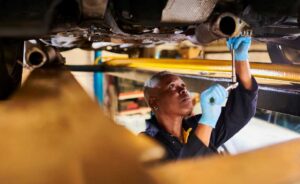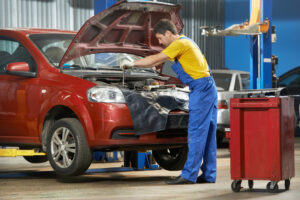Many car owners might be surprised to know that routine vehicle maintenance can enhance a car’s lifespan by up to 50%. This major statistic emphasizes the importance of mechanic services, often overlooked until the proverbial engine light starts blinking. Consider that invaluable preventive care can save both time and money in the long run.
Regular oil changes, tire rotations, and brake inspections are fundamental services every car owner should be familiar with. These basic services not only ensure peak vehicle performance but also contribute significantly to safety. For instance, according to a recent study, minor tire neglect can reduce fuel efficiency by up to 3%, highlighting how routine mechanic services contribute to both savings and safety.

Mechanic Services Every Car Owner Should Know About
Understanding essential mechanic services can make a significant difference in the longevity and performance of your car. Regular oil changes, for instance, are crucial for maintaining engine health. They help to lubricate engine parts, reduce friction, and prevent overheating. Skipping this service can lead to severe engine damage and costly repairs. Most experts recommend changing your oil every 3,000 to 5,000 miles.
Tire rotation and balancing are also important services that ensure even wear and tear. This not only extends the life of your tires but also improves fuel efficiency and handling. Typically, this service should be carried out every 6,000 to 8,000 miles. Regular brake inspections are another key service. They help you catch wear and tear early, keeping you safe on the road.
Advanced diagnostic services are essential when the check engine light comes on or when your car exhibits unusual behavior. Mechanics use special tools to read error codes from your car’s computer. This helps identify problems quickly and accurately. Diagnostic services can uncover issues like faulty oxygen sensors or problems with the ignition system. Addressing these issues early can prevent more severe damage.
Don’t overlook specialty repair services for unique or less common problems. These might include engine rebuilds, transmission repairs, or fixing suspension issues. Specialty services often require mechanics with advanced training and experience. While they can be more costly, they ensure your car is repaired correctly. Getting specialized help can also extend the life of your vehicle.
Essential Routine Maintenance Services
Regular oil changes are a basic yet vital part of car maintenance. This service keeps your engine running smoothly by reducing friction. Mechanics recommend changing your oil every 3,000 to 5,000 miles. It’s a small task that can prevent significant engine damage. Missing oil changes can lead to expensive fixes later.
Another key routine service is tire rotation and balancing. Rotating your tires helps them wear evenly, which makes them last longer. Balanced tires also provide a smoother ride and better fuel efficiency. This service should be done every 6,000 to 8,000 miles. If ignored, you may end up replacing tires more frequently.
Brake inspections are crucial for safety. Regular checks ensure your brakes are in good condition and can stop your car effectively. Worn-out brakes can be dangerous and lead to accidents. During an inspection, mechanics look for worn brake pads and rotors. Replacing these parts on time can prevent bigger problems.
Finally, replacing your air filter is a simple yet important task. Clean air filters improve your car’s performance and fuel efficiency. Mechanics suggest checking the air filter every 12,000 to 15,000 miles. It’s an easy job that makes a big difference. A dirty air filter can decrease your engine’s power and efficiency.
Advanced Diagnostic Services
Advanced diagnostic services play a critical role in maintaining modern vehicles. These services use sophisticated tools to read error codes from your car’s computer system. By identifying issues early, you can avoid more severe problems. For example, a check engine light might indicate a minor issue or a major malfunction. Getting a diagnostic service helps pinpoint the exact problem.
Mechanics often use a scan tool to connect to your car’s OBD-II port. This provides data on various systems within the vehicle. The information can reveal issues with the engine, transmission, or even the exhaust system. A detailed report will guide the mechanic on what needs fixing. This approach saves time and ensures accurate repairs.
Electrical system diagnostics are also essential. Modern cars depend heavily on electronic systems. A problem with the wiring or sensors can impact performance. Diagnostic tools can check the health of these components. Addressing electrical issues early can prevent more serious and costly repairs.
Emissions diagnostics are crucial for both performance and environmental reasons. Poor emissions can indicate problems with the catalytic converter or oxygen sensors. These issues can affect fuel efficiency and car performance. Diagnosing and fixing emissions problems can also help pass state inspections. Ensuring your car runs cleanly benefits everyone.
Specialty Repair Services
Specialty repair services cater to complex issues that general maintenance does not cover. These services often address major components like the engine or transmission. An engine rebuild is a prime example of a specialty repair. This intensive process involves disassembling the engine, cleaning, and replacing worn-out parts. It’s a costly service but can add years to your vehicle’s life.
Transmission repairs are another critical specialty service. The transmission is essential for shifting gears and ensuring smooth driving. Problems with the transmission can lead to hard shifting or complete failure. Specialty mechanics can diagnose and repair or replace faulty parts. Regular maintenance helps, but sometimes, transmission issues require more extensive fixes.
Suspension system repairs ensure a smooth and comfortable ride. The suspension system includes parts like shock absorbers and struts. If these components wear out, you may feel every bump on the road. Specialty repair services can replace worn-out parts and restore your car’s handling. Proper suspension maintenance contributes to overall vehicle safety.
Another specialty area is exhaust system repairs. The exhaust system is crucial for reducing harmful emissions. Problems like a damaged catalytic converter can affect performance and fuel efficiency. Mechanics can inspect and fix issues, ensuring your car runs clean. Regular checks help spot problems before they escalate.
Electrical system repairs often require specialized knowledge. Modern vehicles are equipped with numerous sensors and electronic components. A failure in these systems can lead to significant performance issues. Specialty mechanics can diagnose and fix complex electrical problems. This service ensures all electronic systems in your car function properly.
Bodywork and paint services also fall under specialty repairs. These services fix external damage, such as dents or scratches. Skilled technicians use advanced techniques to restore your vehicle’s appearance. Quality bodywork can also prevent rust and further damage. Investing in these services keeps your car looking its best.
Emergency Roadside Assistance and Towing
Emergency roadside assistance is a lifesaver for drivers. When your car breaks down, having a reliable service to call can make a huge difference. This service often includes help with flat tires, jump-starting a dead battery, and even lockout assistance. Imagine being stranded at night and having someone provide quick, efficient help. Knowing you have roadside assistance brings peace of mind.
Towing services are another critical part of roadside assistance. If your car cannot be fixed on the road, a tow truck can transport it to a garage. This service is essential for serious breakdowns like engine failure. Not all roadside assistance plans include towing, so read your policy carefully. A comprehensive plan will cover both roadside repairs and towing to a repair shop.
Having roadside assistance often means quicker response times. Many providers aim to reach stranded drivers within 30 minutes. This prompt service reduces the time you spend waiting by the side of the road. Quick assistance is especially important in dangerous conditions, like heavy traffic or bad weather. Fast response times can make a stressful situation more manageable.
Roadside assistance providers usually offer coverage 24/7. This round-the-clock service means you can get help anytime, whether day or night. It’s reassuring to know you have support, regardless of when trouble strikes. Some providers also offer apps for easy service requests. These apps can quickly locate your position and send help directly to you.
Cost is an essential factor when considering emergency roadside assistance. Many insurance plans offer it as an add-on at a reasonable price. Standalone services are also available from companies like AAA. These services can save a lot of money in the long run. Weighing the small monthly fee against potential towing and repair costs makes it a wise investment.

Conclusion
Understanding the variety of mechanic services available can significantly enhance your vehicle’s performance and longevity. Regular maintenance like oil changes, tire rotations, and brake checks are crucial. Advanced diagnostics and specialty repairs ensure your car runs smoothly. Taking advantage of these services is a proactive step toward vehicle health.
Emergency roadside assistance and towing offer indispensable support during unexpected breakdowns. Quick and efficient help can make all the difference in stressful situations. Overall, investing in a comprehensive suite of mechanic services is not just wise, but essential for every car owner. It leads to safer, more reliable driving experiences.




Leave a Reply